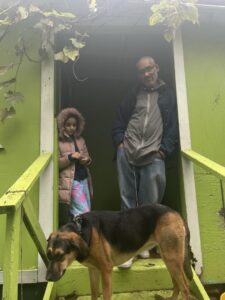Willie Colon blasted from the speakers on Oct. 21 as City Council Member Rafael Salamanca allocated $415,000 of city funds to La Casita de Chema (Chema House) Community Garden, also known as the “Rincon Criollo” in Melrose.
A Bomba Luncheon that featured “lechona” (pulled pork) and “arroz con frijoles” (beans with rice) was served during the event.
La Casita de Chema has lightened the lives of the South Bronx community with Bomba Bomba y Plena rhythms since the late ’70s when Jose Soto Chema turned an abandoned lot into a little Puerto Rican musical hub in the Bronx.
Chema’s youngest daughter, Desseree, said the lime-green house even looks like the one back home in Puerto Rico, “up to the color.”
Desseree is the president of La Casita, an organization whose mission is to preserve a piece of Puerto Rico in the Bronx. This legacy has been passed down through generations, beginning with her father, Jose Chema Soto, to her daughter, Aaliyah Brown, who now serves as a board member for La Casita.
The Chema house is more than just a community garden; it’s a cultural institution. Its musical ensemble, a makeshift group of community volunteers and professionals, perform Bomba y Plena with traditional barrel drums and Puerto Rican tambourines called panderetas, on most Saturdays.
Attendees of all ages come, from those in strollers to those in walkers. It’s all free and open to the public. In addition to performances, the Chema house holds luncheons, drum workshops, dances on stage, and back to school events. And many just come to hang out.
“We welcome everybody,” said long-time volunteer Elizabeth Rodriguez, 67. “We don’t have no name, no quality, no color.”
The garden surrounding the casita boasts a wide array of fruits and vegetables from fig, plum, and apple trees to peppers, jalapenos, and tomatoes, that the community can pluck from.
But the community garden is almost half of what it used to be after developers came in 2006 and moved the Casita de Chema to a smaller lot on 157th Street and Brook Avenue, where water irrigation has been a problem.
The carpeted floors around the house are prone to floods, and unpaved walkways make it hard for people to walk, said Desseree. “The carpeting is an issue with the parks department and plus with the elderly. It’s just not suitable for us anymore.”
The bulk of new funding will go towards improving the irrigation system at Rincon Criollo. Water for the gardens often comes from fire hydrants nearby, which can prompt lawsuits, said Salamanca, who represents Council District 17 of the Bronx.
The project is likely to be completed next season because city developers tend to work at a “snail pace,” he said. “But still to know it’s coming is really gratifying.”
Salamance said the gardens represent a space for members of the community to garden and grow their own produce, which New York City’s backyard-less apartments seldom provide.
As a Council member, he previously has allocated city funds towards Rainbow Garden of Life and Health and Wishing Well Community Garden.
La Casita founder Jose Chema Soto was born and raised in San Juan, Puerto Rico. He moved to the Bronx when he was 21 during “the Bronx is burning” period and brought with him a piece of Puerto Rico — its music.
“His idea was to have a Puerto Rico here in the Bronx,” said Desiree, “and that’s what he did.”

Part hang-out, part music venue, La Casita hosts regular Bomba y Plena drum workshops that are free to the community. Together with Hostos Community College and Nos Quedamos, La Casita forms part of the annual BomPlenazo festival that takes traditional Bomba y Plena dance to the stage.
“He was used to Bomba y Plena music, and he wanted to bring that here when he built this,” said Chema’s granddaughter Aaliyah, “I guess it helped him remember home in a way.”
Bomba’s strong drum beats originated in Puerto Rico, with influences from Africa, Haiti, and Creole. It was a symbol for resistance amid slavery and was recently used in protests over the death of George Floyd. In June 2023, the Rincon Criollo was listed on the New York Historical Registry.
“My dream is that they don’t let it fall and that they remember me as I am, as I was,” Chema said in a BronxNet documentary in 2016.
The Chema house is open Thursday through Sunday, from 12-5 pm, with music performances held on most Saturdays.

